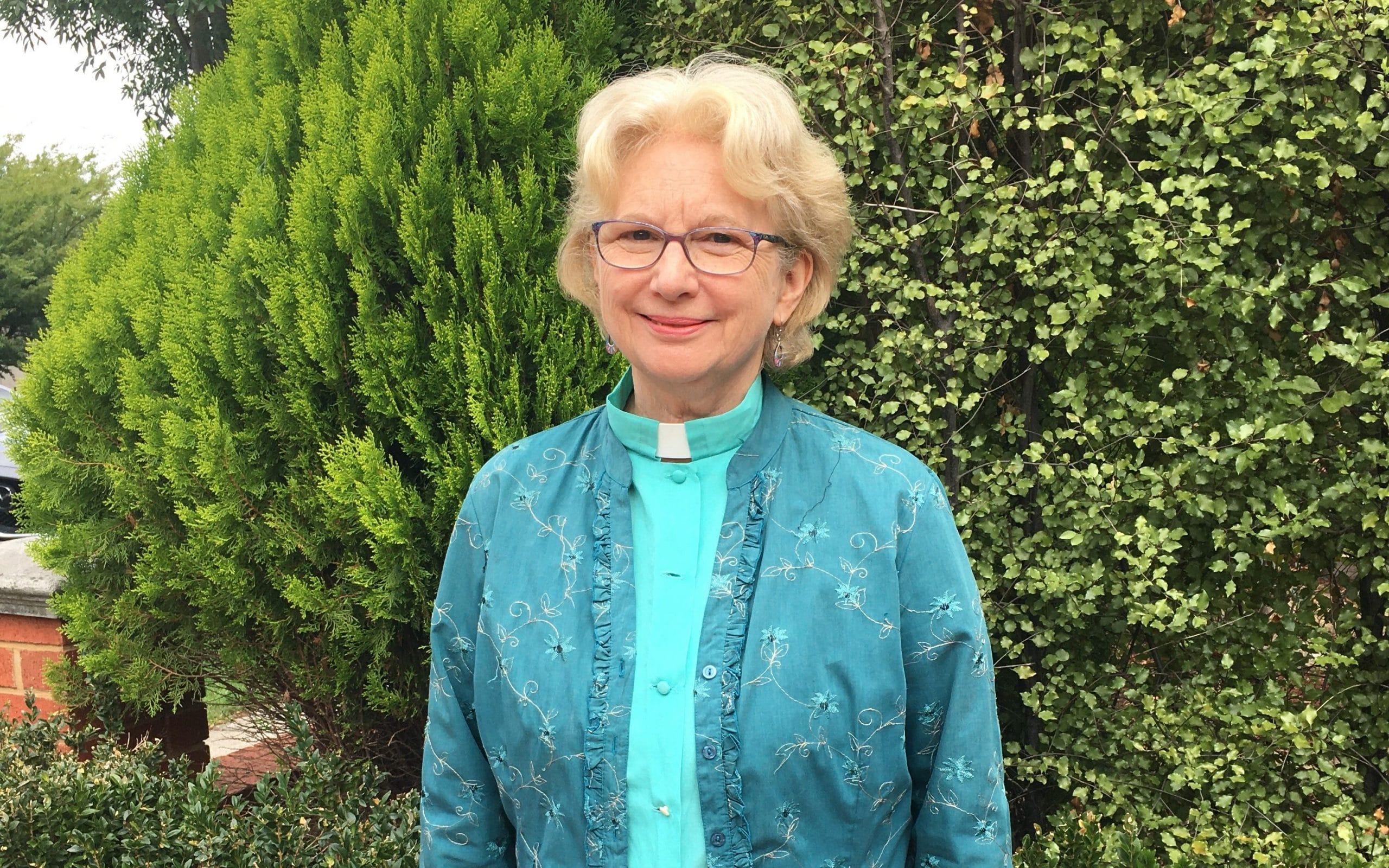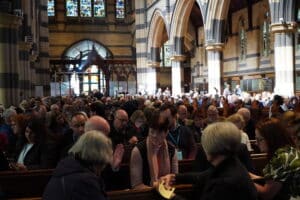
By Mark Brolly
6 April 2022
The Reverend Clem Taplin often winked at the portrait of her father, Archbishop Sir Frank Woods, as she passed it in her work as chaplain for the Anglican Diocese of Melbourne offices, before her retirement in 2021.
Sometimes she sought wisdom from the man who led Melbourne’s Anglicans from 1957 to 1977.
Often, she found the portrait had “Mona Lisa eyes” that followed her around.
Then Clem Woods, she was only six when her family arrived in Melbourne from England. Here they lived at Bishopscourt, the East Melbourne residence of every Anglican leader since Charles Perry in 1853, for the next 20 years.
At no point during that time was her own ordination on her radar. Ordination only became possible for any Australian Anglican woman during the next 15 years. Yet both Ms Taplin’s father and mother left profound legacies for the ordained ministry that awaited her.
Dr Woods sensed that Clem might have a calling before even she did, and lived long enough to see her become a deacon in 1989. He died only a little more than two weeks before she was one of 33 women to become priests in December 1992, the first women ever ordained priests in the Anglican Diocese of Melbourne.
Read more: Struggle continues despite 30 year milestone for women’s ordination
“I struggled with the call into ordained life,” Ms Taplin said.
“I was especially grateful to those who took my deep questions seriously during my training. I desperately didn’t want this direction to be because of my father, and I had gladly left such public living behind.”
Dr Woods had always supported women’s ministry, but he was not keen on women wearing all black like the men, or dog collars. Before Ms Taplin was deaconed, she tried to reassure him.
“I said I couldn’t really refuse to wear one, but would show him mine: soft blue-green, flowered, white pin-tucked. Collars a little looser. He roared with laughter: ‘Well, if that’s what you’re going to wear, that’s all right’,” Ms Taplin said.
Ms Taplin can recall her parents’ love of creation, gardening, the countryside and pets. Home was the centre of their ministry and a cottage in Upper Beaconsfield a treasured getaway from the 1960s, where her father could engage in manual work around the property and her mother, Jean, could indulge in her love of native flowers and birds.
“Any theology that I imbibed was incarnational and creational,” Ms Taplin recalled.
“I think the hospitality was the influence and believing in a massively hospitable God who loved us deeply.
“When I was young, it was always that Jesus came to show us God’s love. It led to His death because it was too inclusive, too dramatic, too wondrous for the people of the time, even His chosen people.”
Ms Taplin’s mother would house women fleeing family violence in a flat attached to Bishopscourt and feed people experiencing homelessness at her back door. Ms Taplin and her older sister Richenda would assist their mother in welcoming guests for dinner.
Read more: How Kathryn went from Christmas trips to her grandparent’s church to ordination
Mrs Woods had to wear a brace and her husband served her breakfast in bed many mornings, before which she would do her spiritual reading, including Hildegard of Bingen and Julian of Norwich.
“I think she was actually quite a mystic.” Ms Taplin said. “But what room was there for women who were mystic in the church of the early ’60s?”
During her father’s episcopate, Ms Taplin would serve for him in the Bishopscourt chapel and loved to drive him to some engagements, a role usually performed by his chaplain.
“A profound experience was accompanying my father to visit the diocese of Carpentaria in 1972 when my mother was not well enough,” Ms Taplin said.
“We toured in the vicar’s plane and diocesan boat around the Torres Strait Islands.”
Ms Taplin joined her parents in England for a time after her father’s retirement and travelled to places as diverse as Afghanistan, Hungary and the United States in subsequent years.
Active in Department of Christian Education adventure camps in her youth, she worked as diocesan children’s worker and as a teacher for a while, becoming active at St Martin’s Deepdene and then as pastoral worker at All Saints’ Northcote in 1984-85.
“I had to have a robe, I had to run services, which I’d never done in my life … I loved it,” Ms Taplin said.
“Eventually, one or two people, including my father, said to me: ‘Darling, are you going to be a pastoral worker forever or are you going to test your vocation?’ I was horrified!”
Ms Taplin went to selection conference and to her “horror”, was selected. But studying at the interdenominational United Faculty of Theology, after prior study through both Ridley and Trinity colleges, helped turn her around.
“Friends thought I might even leave at the retreat but actually I was right by then… The diaconate was the massive turning point for me,” Ms Taplin said.
Ms Taplin was appointed to Mornington, where she was to spend five years.
Read more: Nearly a ‘runaway bride’ at her ordination, this is Jill Firth’s story
“I loved the place, feeling like having the Sea of Galilee on my doorstep. I loved the work with a richly creative, humorous and integrated priest as Ken Parker and a most supportive field committee,” she said.
There, Mr Parker introduced her to female models of ministry, such as Quaker prison reformer and philanthropist Elizabeth Fry, some of whom her mother had read years earlier.
“I was four years a deacon, part of this as deacon-in-charge at Mt Martha, and we had seven retired priests who took turns as the priest … I didn’t know till after I was priested that a few of them weren’t in favour of the ordination of women,” Ms Taplin said.
“I had them come to me and say just the way you’ve conducted your ministry, when you’re behind the altar, it made no difference. They often would be in tears.”
Later, Ms Taplin moved to Vermont South as vicar, initially while pregnant, where she served for seven years.
After a period as assistant at St Stephen’s Mt Waverley, she became assistant at St Margaret’s Eltham. In the meantime, she had “stumbled” into spiritual direction.
“I think that whole contemplative stream is one of the ways of the Church living through these dark ages,” Ms Taplin said.
“It’s interdenominational, it’s non-judgmental … there are massively hurt people who’ve been invisible and are finding their way again. It’s terribly moving. So I feel I’m in God’s place.”






